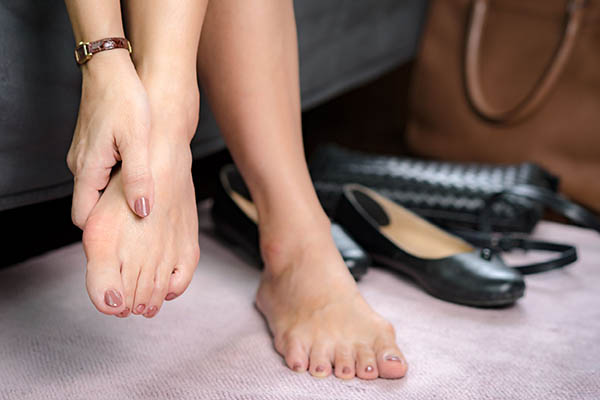June 2nd, 2020

Bunions can be an unpleasant and often a painful condition to live with. If you have painful bunions, proper at-home care is an important part of managing your symptoms and living more comfortably. Keep reading to learn the basic guidelines for at-home bunion care. If you need any medical assistance, you can contact Piedmont Orthopedics | OrthoAtlanta for everything from bunion removal to total ankle replacement in Atlanta.
Maintain a Healthy Weight
If you’re overweight, managing your weight is one of the first steps towards managing bunion pain and growth. Being overweight causes more pressure and strain on your feet, making bunion growth more likely. And, if you have bunions already, the added pressure of a higher body weight can make those bunions even more painful to live with.
Monitor your diet, focusing on lean proteins and vegetables. And, despite the pain you may be experiencing from your bunions, try to stay active. You can start with activities that don’t place too much strain on your feet, such as cycling or water aerobics. By achieving and maintaining a healthy weight, you’ll be helping to manage a long list of other potential health problems, your bunions among them.
Cover the Bunion
One simple way to manage your bunion pain is to cover and protect the bunion with either a strip of moleskin or a gel-filled pad. Both of these can easily be found at a drugstore or grocery store in the pharmaceuticals section. This will reduce the amount of pushing and rubbing on your bunion as you walk, thereby reducing the pain.
Use Shoe Inserts
Bunions often form due to an improper fit in your shoes. Utilize shoe inserts to help properly position your foot inside your shoe. These can be as simple as over-the-counter arch supports. Or, if necessary, we can write you a prescription for more customized orthotic devices.
Buy the Right Shoes
In addition to using shoe inserts, you should also be striving to buy shoes that fit you properly to begin with. Also, look for footwear that has a wide toe area, and avoid any shoes that squeeze your toes together. (If you love those pointy-toed high heels, we apologize, but it’s time to say goodbye.) Try shopping somewhere where they can measure your feet for you to ensure you’re getting the proper size.
Wear a Splint
Talk to one of our doctors before you do this. However, with proper guidance from a medical professional, wearing a splint at night can help hold the toe straight. This eases overall discomfort caused by your bunions.
Use NSAIDs
Non-steroidal anti-inflammatory drugs, such as ibuprofen, can help to reduce pain and swelling caused by your bunions. Take these as needed to reduce any pain you’re experiencing.
Care for Your Feet
Giving your feet a little TLC can make a huge difference in how they feel. Try soaking your feet in warm water, massaging them, and/or applying ice packs. This helps promote proper blood flow to your feet, can reduce swelling and pain from your bunions.
Bunion pain is no joke, and it can interfere with your regular, day-to-day activities. Try these at-home care tips, and if your bunions are still causing you severe pain, contact us to speak to an orthopedic foot and ankle specialist in Atlanta. We can help you figure out how to reduce your bunion pain or potentially schedule a bunion removal. Call now!
Back






